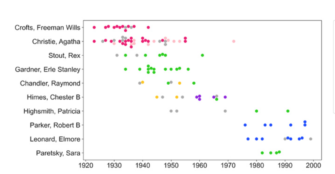Is Your Charity More Like Edgar Allen Poe or Jules Verne?
Edgar Allan Poe arguably invented the modern detective story and was a key creator of the Symbolism movement in poetry, plus he wrote one of the first science fiction novels in 1838.
He died young and penniless.
Jules Verne invented nothing though gets credit in some quarters for inventing the sci-fi genre with his 1863 novel, Five Weeks in a Balloon. But Poe had written a very similar story more than twenty year prior, The Balloon-Hoax (1844).
Verne looked up to Poe and went on to great commercial success, dying wealthy. Poe was focused on exploration and discovery, Verne on exploitation, meaning taking what’s known and maximizing it with high levels of efficiency. This isn’t a moral judgment, after all, the meek borrow, genius steal.
Innovation (Discovery) and Exploitation (Delivery) are co-equal lifefloods of any organization. You need to efficiency to maximize profit but you can efficient your way out of business if you don’t fuel it with new thinking.
Artists, writers and musicians tend to work the way our businesses should, which is a blend of Poe and Verne. This visual shows analysis from an English professor, Ted Underwood, that built a model for 11,000 works of fiction that categorizes books into topic by analyzing the text.
This visual shows 10 crime fiction authors with each dot being a book plotted by publication year and colors reflecting the topic.

Lots of exploitation here, getting ruthlessly efficient at telling the same story over and over. If you’ve read one Agatha Christie book you’ve read em’ all.
But, further investigation into authors, artists and musicians shows a more complete, nuanced pattern. A study by Dashun Wang looked at “hot streaks” in the arts and found that a hot-streak (i.e. steady pattern of hits) was preceded by a diverse set of works.
Each found a winner and exploited the heck out of it.
This is how your charity should operate. Innovation can and should be ongoing. It’s your R&D spend and just like acquisition, if you don’t feed it, you don’t have a pipeline of new ideas.
And just like any R&D effort, the aim is to find winning ideas that get pushed into production or in this case, the main business that can provide delivery at scale.
Kevin



Your column comes at a good time for me. I am finishing a memoir about the opportunities that have made themselves available to me. How I have reacted and the benefits derived not just for me, but for our profession.
You article has me thinking of Innovation & Exploitation. Or as you parenthetically say “Discovery and Delivery” Certainly delivery as a word takes the sharper edge off of Exploitation. I actually believe exploitation is more descriptive of the challenges faced in fundraising, witness the reluctance to change or alter methods and procedures.
Thanks you made me think.
Bob,
Thanks as always for your readership and contribution to the Agitator audience with your commentary. Glad to hear this post was useful for your reflection and memoir writing. I agree with your assessment, the “because it works” refrain is commonplace and it can be true and wrong at the same time. What works is always relative and limited by the range of our thinking. What works is also often, not always, a statement about the immediate, short term results. Those results are full of noise no matter how “statistically significant” and they may be in direct conflict with what works medium and long term.